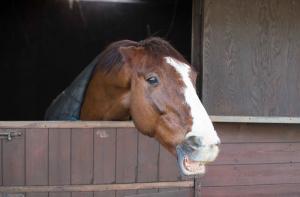Before we discuss strategies that deal with aggression, we need to be clear about what aggression actually is. Aggression is hostile or violent behavior directed at someone. That’s pretty straightforward.
Here’s another definition: the action or an act of attacking without provocation. This reflects the view of many people when they witness or interact with aggressive horses. They speak about the horse like this: It’s just an aggressive horse. They may also say it’s alpha or dominant.
There is a common perception in the horse world that some horses are born aggressive or have inherently aggressive tendencies. This could be true if the horse has a neurologic deficiency or damage, such as a genetic mutation that impairs brain function or triggers aggressive behavior. Otherwise, in a healthy horse with normal brain function, this is not the case.
Horses do not become angry for no reason. Being aggressive, with behaviors such as biting, kicking, chasing, etc., takes a lot of effort and physical energy to carry out. Horses are generally inclined to preserve their energy, because they never know when they might need it.
Therefore, if a horse is behaving aggressively, he has a good reason to behave that way. That doesn't mean the reason will be apparent to us. In fact, it might oftentimes seem as though it’s happening “out of the blue.” No matter what we think or believe, an aggressive horse is highly motivated to act out and could very well feel as though it has no other choice.
An aggressive horse is being fueled by his survival instincts. Again, whether or not we think the aggressive behavior is warranted, the horse believes it is and is experiencing powerful emotions that are triggering his actions. In other words, a horse that has escalated that much is experiencing a high level of distress, high enough to feel the need to defend himself in an aggressive manner.
Dealing with aggressive horses can be tricky. Resolving aggressive behavior is often best left to qualified behavior-based trainers. “Beating” the behavior out of the horse or otherwise punishing the horse is not ethical, human, or effective in the long term, even though you might be able to repress the behavior for a short time.
The best solution is to assess the horse’s situation and reduce or remove the triggers that are causing the horse to behavior aggressively.
Five Tips for Managing and Reducing Aggressive Behavior:
1. Thoroughly evaluate the horse for pain, imbalances, and other physical issues. A horse has to feel good to behave calmly and be able to handle stress. Areas that need to be examined are teeth, hooves, muscle condition, joint function, and diet. Ulcers are another major contributor to aggressive behavior. This may take more investigating than a simple trip to the vet.
2. Make sure your horse has what he or she needs to be a happy individual. That includes freedom to move, friends, fresh air, sunshine, protection from elements, 24/7 access to forage, and mental enrichment.
3. Make safety your #1 priority. If your horse is aggressive toward people, take precautions during interactions, such as working with the horse from the other side of a safe barrier to protect yourself from harm. Always take steps to make sure the environment is horse-friendly to keep your horse safe, too.
4. Make each encounter with the horse as pleasurable as possible. Food and healthy treats are a great way to change a horse's view of humans. Put no demands on the horse that he can’t handle. In other words, don’t stress the horse or do anything to trigger aggressive/defensive behavior. Over time his need to react and the reactions themselves will become weaker if he is no longer feels motivated to behave that way.
5. Give the horse a choice. If your horse doesn't want to interact or perform a specific task, don't force it. It’s important for your horse to know he’s being listened to and heard. The more understanding, compassionate, and responsive you are to what the horse is experiencing, the less loudly he’ll have to yell at you to try to get his point across.
Bonus Tip:
Use positive reinforcement and the principles of compassionate communication to help your horse replace his aggressive/defensive behavior with new, healthier responses.
Find out more about Dale Rudin and her Un-natural Horsemanship at: www.Un-NaturalHorsemanship.com
Editor’s Note: Additional resources on aggression in horses:
Fraser, Lauren, Equine Behaviourist. 2017. “Aggressive Horses: Causes and Cures.” (Nov. 29). https://www.equinebehaviorist.ca/post/2017/11/29/aggressive-horses-causes-and-cures
Harrison, Justine, Equine Behaviourist Blog. 2015. “Why Are Some Horses Aggressive?” https://www.equinebehaviourist.co.uk/blog/2015/1/24/why-are-some-horses-aggressive
Horsetalk. 2016. “Humans usually behind abnormal aggression in horses – review.” (Jan. 11) https://www.horsetalk.co.nz/2016/01/11/humans-aggression-horses-review/
Landsberg, Gary M. 2014. Behavioral Problems of Horses. Merck Veterinary Manual. (May) https://www.merckvetmanual.com/behavior/normal-social-behavior-and-behavioral-problems-of-domestic-animals/behavioral-problems-of-horses
Paulick Report. 2016. “Abnormal Aggression In Horses Typically Triggered By Humans. (Jan. 12).
https://www.paulickreport.com/horse-care-category/148316/
Olcsak, Katarzyna and Czeslaw Kloceck. “A Review of Aggressive Behavior in Horses.” Journal of Interdisciplinary Research. http://www.magnanimitas.cz/ADALTA/0402/papers/G_olczak.pdf
Omega Fields. 2018. Handling Aggression In Horses. (April 23). https://www.omegafields.com/2018/04/23/handling-aggression-horses/







